Behind the direction of GLAAD award-winning filmmaker Sekiya Dorsett (The Revival Movie (director), Netflix’s In Our Mother’s Gardens (DP), NBC’s Stonewall 50: The Revolution (director)), and co-written by Karl O’Brian Williams, Artistic Director for Braata Productions New York’s iconic Caribbean arts organization, a story concept inspired by an interaction in a local deli became a reality. In partnership with the Caribbean LGBTQ+ non-profit, Caribbean Equality Project, Caribbean Queen, is an upcoming short film centering self-expression, acceptance, and the power of dreams. It tells the compelling story of Q, a young Caribbean individual facing adversity and prejudice in pursuit of their dream to become the Queen of the West Indian Day Carnival Parade. While navigating homophobia and pressures at home, they come to learn that it’s less about the frills and dressing up for the Carnival Parade, but it’s about having the confidence to be who you truly are.
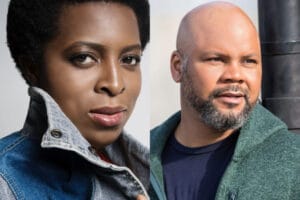
On speaking with us about the beginnings of the storyline and the build-up of the team, she mentions the idea originally came from her cinematographer of this film, Tiffany Amour Tejada. Tiffany painted this scene for Dorsett of a vision she had of a young boy in a deli switching between what he thought others would prefer him to present himself and who he truly was.
“He had a sort of like a feminine quality to him. And you know she had been living in Flatbush for a certain length of time. and she said, ‘I could only imagine what may be going on as you’re in this space. That’s, you know, heavily patriarchal, you know, heavily cultural, but still trying to navigate your sexuality in that space’. And that’s when we started to think about you know who this person could be, and then she mentioned being at Carnival. I was like, what could you mean? Could he be here? How would he be navigating Carnival?”
After that lunch, Dorsett continues, “I wrote up four pages and I called Karl O’Brian Williams. […] Karl’s a writer extraordinaire, and I knew that I needed someone to help me bring it with the nuance of the language of all of those things. The only thing I had was like, there was this boy in a Deli, and he was confronted when he was on an errand for his aunt, and what that could be like. And we kind of blew it out. Now it’s you know, this amazing story about, Q.”
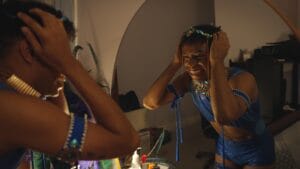
With a creative team from all over the Caribbean diaspora, including Jamaica, Panama, Bahamas, and Guyana, there was an intense focus on crafting a film that resonated with the Caribbean culture and the LGBTQ community in all aspects. And it was crafted with passion. Now, after placing blood, sweat, and tears into filming, the team is in the stage of fundraising for post-production as the next step.
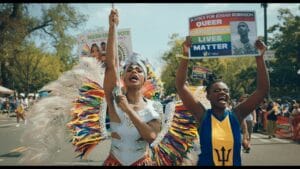
Caribbean Equality Project
We had the pleasure of speaking with Mohamed Q. Amin, founder and executive director of the Caribbean Equality Project (CEP) and executive producer of Caribbean Queen. The conversation led to how this film played a part in the storytelling of the lives and perspectives of what CEP works to advocate for.
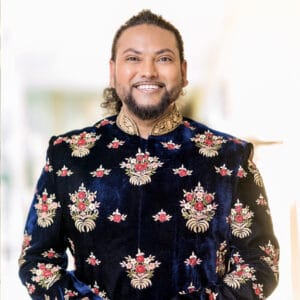
In 2013, he, his brother, and his partner survived a hate crime incident in Richmond Hill, Queens, a predominantly Caribbean neighborhood. And while that is where he lives, he wasn’t safe. “I realized I wasn’t safe in my own Caribbean neighborhood. And I spent 2 years navigating that hate crime incident, seeking healing through counseling and media training to turn my trauma into activism, tools I needed during my recovery journey,” he stated.
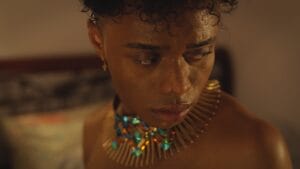
As a result, the Caribbean Equality Project was founded as his call to action in 2015 to provide these resources to others in his community and beyond.
The Caribbean Equality Project (CEP) is a non-profit organization that advocates for and works towards LGBTQ+ rights and equality within the Caribbean diaspora. The organization focuses on creating awareness, fostering inclusivity, and addressing the unique challenges faced by the LGBTQ+ community within Caribbean immigrant populations in the United States. Since being founded, they’ve provided culturally responsive support groups, food pantries, immigration resources, mental health services, and civic engagement to build political power. However, asylum work has always been a place where a lot of the work lies.
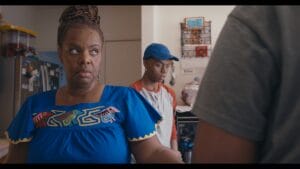
“Many of our community members have been abandoned by their family, have been rejected, and fled their home country because of prosecution,” Amin describes. “Immigrants and asylum seekers from places like Guyana, where I’m from, or the Bahamas, where Sekiya is from, are coming to organizations like Caribbean Equality Project” for support to survive. Being both culturally responsive and culturally competent to serve LGBTQ+ immigrants in their language aids in their comfort towards their acclimation and guides them to a new path towards life to express how they choose in their new home. “And also doing it in a way,” he continues, “with care and love. And that is the work I do with the Caribbean Equality Project, and eight years later, we continue to amplify Caribbean LGBTQ+ people’s resilience through direct services and storytelling.”
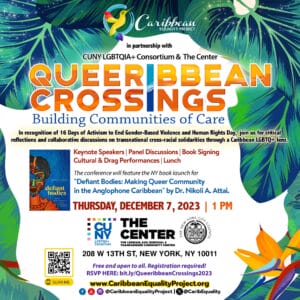
Keep up with events, like their December 7th Queeribbean Crossings Conference at The LGBT Center in Manhattan and their work here on their site and Instagram.
The official release of the film is expected in February 2024, and there are ways you can support them as they enter the post-production phase of the short film right now! Check out the Caribbean Queen site here to see how you can donate and support the work and what to expect from both the project and your donation.












